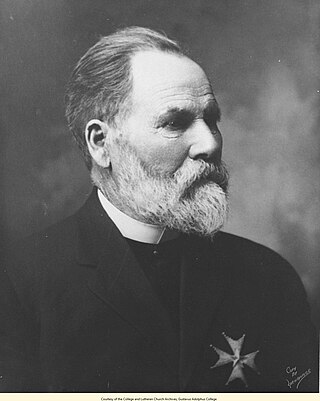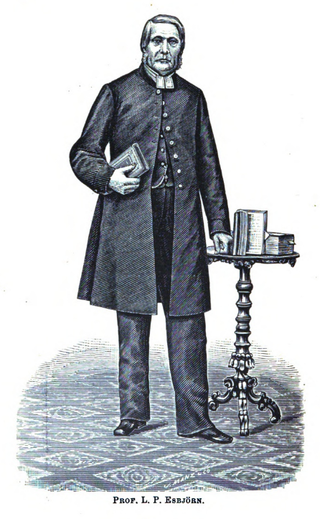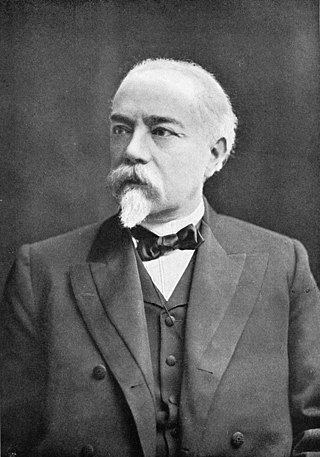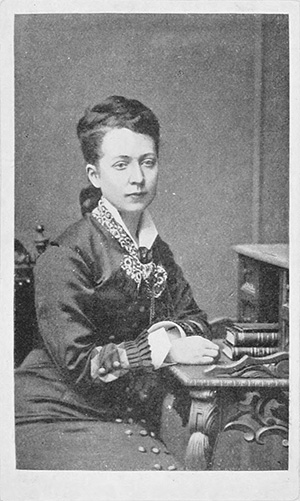Related Research Articles

Eric Norelius was a Swedish-American Lutheran minister, church leader, and author.

Swedish Americans are Americans of Swedish descent. The history of Swedish Americans dates back to the early colonial times, with notable migration waves occurring in the 19th and early 20th centuries and approximately 1.2 million arriving between 1865–1915. These immigrants settled predominantly in the Midwest, particularly in states like Minnesota, Illinois, and Wisconsin, in similarity with other Nordic and Scandinavian Americans. Populations also grew in the Pacific Northwest in the states of Oregon and Washington at the turn of the twentieth century.

Paul Petter Waldenström was a Swedish lecturer, priest in the Church of Sweden and theologian, member of the Riksdag, and writer, who became the most prominent leader of the free church movement in late 19th-century Sweden.

The Swedish Evangelical Mission (SEM) is an independent, low-church, New Evangelical movement within the Church of Sweden. Described as "middle-of-the-road" due to maintaining its independence within the church while not separating from it, the association emphasizes the importance of lay involvement and is rooted in 19th-century Swedish revivalism and the Mission Friends movement.

Tuve Nilsson Hasselquist was a Swedish American Lutheran minister and church leader. He was the second president of Augustana College, serving from 1863 until his death in 1891.

Lars Paul Esbjörn was a Swedish-American Lutheran clergyman, academic and church leader. Esbjörn was a founder of the Augustana Evangelical Lutheran Church and of Augustana College. He served as the first president of Augustana College from 1860 until his resignation in 1863.
The Swedish Lutheran Publication Society was a publishing organization which was founded by Tuve Hasselquist in Galesburg, Illinois. It was then reorganized and moved to Chicago in 1859. It was severely damaged in the Chicago fire of 1871, but the society and its successors were responsible for publishing most of the Swedish-language books in the United States in the era. Beginning in the late 1850s, the society published periodicals, first the Minnesota Posten and later the originally independent Det Rätta Hemlandet which moved beyond church news, becoming a political newspaper later in the 19th century.

Erland Carlsson was a Swedish-American Lutheran minister. He was one of the founders and served as president of the Augustana Lutheran Synod.

Carl David af Wirsén was a Swedish poet, literary critic and the Swedish Academy's permanent secretary 1884–1912.

Elisabet Kristina Hilma Angered Strandberg, was a Swedish writer. She mostly wrote under the name Hilma Strandberg of the pseudonym, "Lilian".

Nils Gustaf Nicolaus Bergensköld (1838–1907) was a Swedish-American Lutheran clergyman and an early leader of the revivalist movement within Swedish immigrant settlements of the Midwestern United States during the later part of the 19th century.
Andrew Jackson was a Swedish-American Lutheran minister who served as president of the Minnesota Conference of the Augustana Evangelical Lutheran Church.

Peter Lorenz Sellergren was a Swedish Lutheran priest, theologian, and gammalkyrklig revivalist preacher.

The Fjellstedt School was a private boarding school in Uppsala, Sweden, founded in 1862 and closed in 1982, with the main aim of preparing students for academic studies in theology and the priesthood in the Lutheran Church of Sweden.
Svenska Sällskapet för Nykterhet och Folkbildning, previously Svenska nykterhetssällskapet until 1902 and Svenska Sällskapet för Nykterhet och Folkuppfostran until 2021, is an organization that promotes temperance and ethical education based on Christian principles. During the 1840s and 1850s, the organization was the center of the temperance movement in Sweden and had up to 100,000 members.

Svenska Amerikanaren Tribunen is a Swedish-American weekly newspaper which was published in Chicago and read by Swedish immigrants.

Ernst Wilhelm (William) Olson was a Swedish-American journalist, publicist, writer, and translator. He has been described as "one of Swedish-America's foremost literary figures".

Dr. Charles W. Roback or Dr. C. W. Roback was a manufacturer of patent medicines, an astrologist, a fortune teller, and a charlatan in the United States. Roback was nicknamed Fallebo Gök in his native Sweden, where he fled due to fraud charges in 1843.
Johannes (John) Telleen was a Swedish American Lutheran pastor and newspaper founder.

Den svenska psalmboken – av Konungen gillad och stadfäst(ad) år 1819, also called the 1819 Hymnal and the Wallin Hymnal, was used in Sweden from 1819 to 1937 and contained 500 hymns.
References
- ↑ "About Hemlandet det gamla och det nya. (Galesburg, Ill.) 1855-1870". Chronicling America - Library of Congress. Archived from the original on 2014-03-18. Retrieved 2014-03-18.
- 1 2 3 "Hemlandet". Minnesota Historical Society . Archived from the original on 2021-06-19. Retrieved 2022-06-09.
- ↑ Hogan, Terry (2007-10-04). "Backtracking, The Galesburg Land Company". The Zephyr.com. Archived from the original on 2015-09-07. Retrieved 2014-03-18.
- ↑ "Svenska-Amerikanaren". Nordisk familjebok. Archived from the original on June 11, 2015. Retrieved October 11, 2015.
- ↑ Backlund, Jonas Oscar (1952) A Century of the Swedish American Press. Chicago, IL : Swedish American Newspaper Co.
- ↑ "Johan Alfred Enander". Augustana College. Archived from the original on March 4, 2016. Retrieved October 11, 2015.
- ↑ "Svenska Amerikanaren". Minnesota Historical Society . Archived from the original on 2022-06-09. Retrieved 2022-06-09.
- ↑ "LibGuides: LCA Collection 056. Rätta Hemlandet och Missionsbladet, 1863-1869: Overview". Gustavus Adolphus College . Archived from the original on 2022-12-06. Retrieved 2022-06-10.